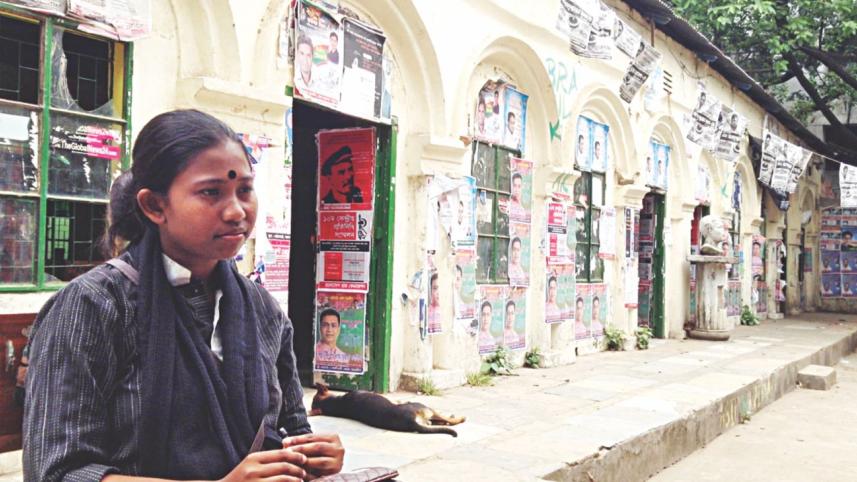Of protests and perceptions

WE have had a bad start, haven't we? Day 1 did not go well at all. Pohela Boishakh celebrations ended with a series of sexual assaults that took place at TSC, Dhaka University, which is one of the central hubs of the Bengali New Year's celebration. The heinous crimes once again reminded us of the monsters who live among us.
Unfortunately, it seems our society never runs out of such occurrences that remind us of this: from numerous rapes to harassments to verbal attacks.
What follows after many such events are protests and reactions, of varying sizes and strengths, carrying different opinions and messages, depending upon the person's or group's outlook and perception of women and society - the good, the bad and the ugly.
Lucky Akter, the fiery revolutionist of Gonojagaran Mancha and General Secretary of Chhatra Union's central committee -- an aspiring figure indeed, with her strong, confident personality -- is among millions of others who were stunned and deeply disturbed by the occurrences that took place. She came to know about it at around 8pm that day.
"I was shocked when I found out what had happened. Actually, somehow it seems TSC has become somewhat of an epicentre of attacks and assaults -- from the attacks on author Humayun Azad and the murder of blogger Avijit Roy to the recent sexual assaults," she said.
Watch Lucky Akter's exclusive interview on the social reason behind sexual harassment

Many members of Chhatra Union had reacted to the assaults on the spot - defending the victims and fighting the abusers - whilst the police and the authorities allegedly did little to bring the situation under control. A six-point demand on the matter was presented.
Meanwhile, many people across different segments of society have spoken up against this incident, demanding punishment of the offenders. "If we can bring these criminals under the law, it would set an example for others," Lucky said. "But in most cases, we see them above the law, getting away without punishment. This makes them even more reckless and dangerous."
But perhaps the most unfortunate thing of all, regarding the aftermath of such crimes, is that a large section of people begin scrutinising and blaming the victim. "Whenever such an incident occurs, the main focus seems to be the victims and what they might have done wrong, instead of concentrating on the offenders," Lucky observes.
Social media, after the assaults took place, became flooded with commentary. Many of them, sadly, put the blame on the victims, questioning their 'decency', calling them 'characterless' and so on.
Society has set standards and expectations for the sexes, and we are raised that way, right from childhood, in our homes and in schools. "The idea of a male-dominated society is not just believed by men; many women too agree and abide by it," Lucky opined.
From literature to movies to advertisements, the idea of objectifying women runs rampant. This naturally affects our psyche.
Lucky shared her own experience during the Shahbagh revolution. "My phone number was posted on various pornographic websites. I used to get a lot of appalling calls, and people suggested that I get a new number, although I decided to stick to the one I got and see what happens," she exemplified.
Being a female activist, and because she does not conform to the role of women in a patriarchal society, she faces a lot of unwanted and frustrating attention. "If you follow my Facebook page, you will see people attacking me or people posting scandalous things," she candidly said.
So, what is the way out? Well, the ultimate protest would be a long-term effort to raise awareness among the general people. Meanwhile, we must speak out boldly against such atrocities.
Be vocal. If you see someone writing derogatory and demeaning things about the victims of the sexual assaults, write a line or two countering that. Ask your friends to do the same.
Being united is the most important aspect. Lucky explains it with an example. "The garment workers, after work -- which is often late in the evening or in the night -- return to their homes in large groups. So, in case any problem arises, they can fight back together, united. The way garment workers protest and react in a united manner is an inspiration for us. "
In the first place, why should one feel insecure in the streets? But in the world we live in, such is unfortunately the case.
"The police and the authorities had expressed their doubts about the 'extent' of the incidents that took place at TSC. So what is the 'extent' from which you will consider those acts as sexual assaults and take responsibility?" Lucky demands.
A woman has to fill in many shoes, being a mother, a daughter, a professional and so on. For men, it seems just being able to earn enough is the only yardstick to call him successful. A woman, on the other hand, is constantly pressurised to be perfect in all roles.
From demanding perfection to objectifying them, the general perception men holds towards women -- and women themselves hold towards each other -- must change. Only this will make way for a more tolerable society.
 For all latest news, follow The Daily Star's Google News channel.
For all latest news, follow The Daily Star's Google News channel.